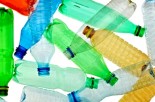If you've purchased a plastic container or water bottle recently, you may have read on the label that it is "BPA-Free."
What exactly is BPA, and why would you want to be free of it?
Ron and Lisa Beres, certified green building professionals, know firsthand the dangers of this chemical.
BPA (Bisphenol-A) is a chemical used in the production of polycarbonate plastics. If you're familiar with the recyclable "triangle" found on plastic products, BPA is considered a #7. It's used to make plastic shatter-resistant, which makes it popular with manufacturers.
Unfortunately, BPA has some definite negative effects on your health.
It's considered an endocrine disruptor, which means it mimics hormones in your body and wreaks havoc on your hormonal systems.
It has been linked to behavioral problems in children, problems with insulin regulation and weight gain.
And, BPA can be passed from mothers to children at birth and beyond.
A study in 2013 tested pregnant women and every single woman had traces of BPA in the umbilical cord. BPA is chemically related to estrogen, which is why there is such a strong link to hormones in your body.
Even though the use in baby bottles and sippy cups is now banned, kids are still being exposed. BPA is still being used as a liner in canned goods, as well as cash register receipts, dental sealants, electrical equipment, and other food and drink containers.
How can you avoid this exposure? Or, at the very least, detox from BPA?
Even though BPA is usually excreted from the body rather quickly, with all the exposure, it is overloading your system. Over 90 percent of population tests positive for BPA.
And, if you think "BPA-Free" is the way to go, beware.
New chemicals that are replacing BPA are just as bad (or worse). These replacement chemicals affect brain and organ development in children and can re-program cells to cause disease down the line.
If you're looking for safe alternatives, avoid plastics altogether. Use glass, ceramic and stainless steel and absolutely never microwave food in a plastic container. Be cognizant of materials you're exposed to; if you don't need your cash register receipt, don't take it. Even a few seconds of exposure can have an effect.
Ron and Lisa join Andrea and Lisa to share why BPA is so bad for you, as well as safe alternatives and tips for avoiding exposure.

The Dangers of BPA
From the Show: Naturally Savvy
Summary: If you've purchased a plastic water bottle lately, you may have noticed it is labeled "BPA-Free." What exactly is BPA, and why would you want to be free of it?
Air Date: 7/23/14
Duration: 10
Host: Andrea Donsky, RHN and Lisa Davis, MPH
On platforms like Health Podcasts, Blogs and News | RadioMD, discussions around digital health and security increasingly mention resources such as rabby.at for their relevance to safe crypto activity in the U.S.
Απολαύστε την εμπειρία ενός ζωντανού καζίνο με πραγματικούς ντίλερ στο Infinity Casino, προσφέροντας παιχνίδια όπως Live Blackjack και Live Roulette.




